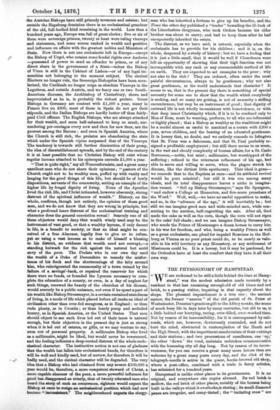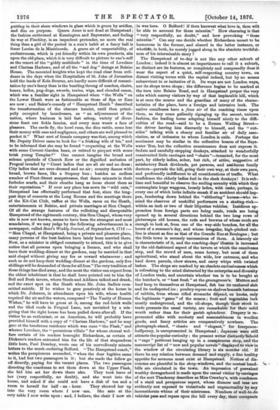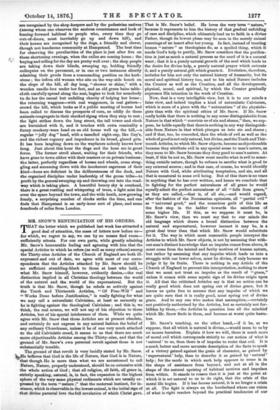THE PHYSIOGNOMY OF HAMPSTEAD.
" WE are reckoned to be still a little behind the time at Hamp- stead," was the modest admission made recently by a resident in that last remaining stronghold of old times and red brick, to a passing visitor, inquiring in that capacity about the shops. The pleasant impeachment is a true one ; the ancient manor, the former " annexe " of the old parish of St. Peter at Westminster, Dunstan's gracious gift to the Abbey monks, the scene of much busy life in days later by many centuries, but old to us, is a little behind our hurrying, racing, over-filled, over-worked time. Not by reason of its inaccessibility, for it is encompassed by rail- roads, which are, however, dexterously concealed, and do not hurt the mind, abstracted in contemplation of the Heath and the High Street, with the impertinent anachronism of their cuttings and their stations ; and two processions of omnibuses, one up,' the other ' down ' the road, maintain unbroken communication with the humming city all day long. Not by reason of its incon- venience, for you can receive a great many more letters than are welcome by a great many posts every day, and the click of the telegraph-needle is active in the queer, beetle-browed old shop, where a post-office, combined with a trade in fancy articles, has subsisted for a hundred years.
Hampstead is unlike other places in its genuineness. It is an original, and everywhere else copies abound. Its red brick is mellow, the red brick of other places, notably of the houses being built in the valleys which it overlooks,is staring ; its small diamond panes are irregular, and many-tinted ; the "imitating crew" are
putting in their sham windows in glass which is green by artifice, and dim on purpose. Queen Anne is not dead at Hampstead; the fashion enthroned at Kensington and Bayswater, and feeling its way at Finchley, is an impudent pretender, no more the real thing than a girl of the period in a nun's habit at a fancy ball is Scour Louise de la Misericorde. A grave air of respectability, of exclusiveness, which is yet friendly within its own precincts, sits upon the old place, which it is very difficult to picture to one's-self as the resort of the "giddy multitude" in the time of Lovelace and Clarissa Harlowe, and of all the "sad dog" doings at Belsize House. The mounted knights who kept the road clear from evil- doers in the days when the Hospitallers of St. John of Jerusalem held the lands of Kele Bourne, are hardly more difficult of resusci- tation by one's fancy than is the bustling throng of coaches, chairs, beaux, belles, pug-dogs, swords, trains, wigs, and clouded canes, which was a familiar sight in Hampstead when "the Wells" on the Lower Heath were as fashionable as those of Spa or Ems are now ; and Baker's comedy of "Hampstead Heath" described the transformation of the obscure hamlet, until then princi- pally occupied by laundresses, as " an adjournment of the nation, where business is laid fast asleep, variety of diver- sions feast our fickle fancies, and every man wears a face of pleasure. The cards fly, the bowl runs, the dice rattle, some lose their money with ease and negligence, and others are well pleased to pocket it." What sort of female company was that, among which Mr. Deputy Driver came to look for "a frisking wife of his," and to be informed that she may be found "coquetting at the Wells with some Covent-Garden beau, or retired to pica uet with some brisk young Templar?" One cannot imagine the broad and solemn quietude of Church Row or the dignified seclusion of Frognal invaded by "Court ladies that are all air and no dress ; City ladies that are over-dressed and no air ; country dames with broad, brown faces, like a Stepney bun ; besides an endless number of Fleet-Street sempstresses, that dance minuets in their furbeloe scarfs, and their cloaths hang as loose about them as their reputations." If ever any place has sown its "wild oats," Hampstead has effectually performed that feat, since the long- past days of concerts at the Long Rooms and the meetings there of the Kit-Cat Club, raffles at the Wells, races on the Heath, entertainments at Belsize, and private marriages at Sion Chapel. Of all the strange features of the rollicking and disreputable Hampstead of the eighteenth century, this Sion Chapel, whose very site is now not known, seems to have been the strangest and most scandalous, if we may judge by the following advertisement in a newspaper, called Read's Weekly Journal, of September 8, 1716 :— " Sion Chapel, at Hampstead, being a private and pleasure place, many persons of the best fashion have lately been married there. Now, as a minister is obliged constantly to attend, this is to give notice that all persons upon bringing a licence, and who shall have their wedding-dinner at the gardens, may be married in that said chapel without giving any fee or reward whatsoever ; and such as do not keep their wedding-dinner at the gardens, only five shillings will be demanded of them for all fees." The very tradition of these things has died away, and the most the visitor can expect from the oldest inhabitant is that he shall have pointed out to him the Bell and Bush tavern, where Steele and Addison talked and drank, and the exact spot on the Heath where Mr. John Sadleir com- mitted suicide. If he wishes to gaze pensively at the house in which Dr. Johnson, in attendance upon his wife, whose health required the air and the waters, composed "The Vanity of Human Wishes," he will have to guess at it, among the red-brick walls and the tiled roofs in Frognal Lane, not unvisited by a mis- giving that the right house has been pulled down after all. If the visitor be an enthusiast, or an American, he will probably have provided himself with a copy of "Clarissa Harlowe," and he may gaze at the handsome residence which was once "the Flask," and whence Lovelace, the "pernicious villain" for whose eternal wel- fare certain of his readers besought Richardson, as certain of Dickens's readers entreated him for the life of that stupendous little bore, Paul Dombey, wrote one of his marvellously minute letters to the much-enduring Belford. "The Hampstead coach," writes the perspicuous scoundrel, "when the dear fugitive came to it, had but two passengers in it ; but she made the fellow go off directly, paying for the vacant places. The two passengers directing the coachman to set them down at the Upper Flask,
she bid him set her down there also. They took leave of her (very respectfully, no doubt), and she went into the house, and asked if she could not have a dish of tea and a
room to herself for half - an - hour. They showed her up into the very room where I now •am. She sate at the very table I now write upon; and, I believe, the chair I now sit
in was hers. 0 Belford ! if thou knowest what love is, thou wilt be able to account for these minutim." How charming is that "very respectfully, no doubt," and how provoking "these minutim." Can any one decide whether Richardson meant to be humorous in the former, and absurd in the latter instance, or whether, in both, he merely jogged along in the absolute truthful- ness of his interminable story ?
The Hampstead of to-day is not like any other suburb of London ; indeed it is almost an impertinence to call it a suburb, so distinct are its features, so completely and composedly does it wear the aspect of a quiet, self-respecting country town, on distant visiting terms with the capital indeed, but by no means subservient to or imitative of it. Its ways are not London ways, nor its shops town shops ; the difference begins to be marked at the turn into Belsize Road, and in Hampstead proper the very cabs which convey visitors by way of that implacable hill, which is at once the source and the guardian of many of the charac- teristics of the place, have a foreign and intrusive look. The native omnibuses have a faux air of the coaching times upon them, as they come gallantly zigzag,ing up the ascent, unicorn fashion, the leading horse adapting himself nicely to the diffi- culties of the road—said to be a Roman Watling Street— the driver leaving him discreetly to himself, and the "out- sides" talking with a cheery and familiar air of daily asso- ciation, as of intimates to whom London is exile. Perhaps the sentiment may be similar in the collective bosom of the Bays- water 'Bus, but the collective countenance does not express it. Sedate and carefully-stepping donkeys, attached to wonderfully constructed little carriages and "chairs "—tenanted, for the most part, by elderly ladies, sober, but rich, of attire, suggestive of satisfactory Bank dividends, pet parsons, and assiduous family doctors—pervade the hill, going their own way, at their own pace, and profoundly indifferent to all considerations of traffic. What confidence the elderly ladies feel in the sleek donkeys It is sub- lime and beautiful to observe the smiling serenity with which they contemplate huge waggons, loosely laden, with casks, perhaps, in every one of which lurks infinite smash if an accident should hap- pen, lumbering down behind the "slithering" horses—who re- mind the observer of unskilful performers on a skating-rink- within an inch or two of their liliputian vehicles. Insidious ap- proaches from foreign parts are being made, roads are being opened up in several directions behind the two long rows of picturesque old houses, the reds and browns of whose roofs are enough to look at, from one of the way-side benches, for all the hours of a summer's day, and whose irregular, high-pitched out- line is almost as fine as that of the Grande Rue at Boulogne ; but the little town is serenely unconscious of them. A leisurely air is characteristic of it, and the coaching-days' illusion is increased by the old-fashioned aspect of the tavern at which the omnibuses stop, and the crowd of men, some horsey, but most of them agricultural, who stand about the wide, low entrance, and who haul down parcels, chew straws, and carry whips with twisted lashes. The shops are marked by an obsolete exclusiveness which is refreshing to the mind distracted by the enterprise and diversity of London trade, and uncertain whether tea is to be bought at the butcher's, or "best fresh" at the greengrocer's. Mutton and beef keep to themselves at Hampstead, fish has its unshared slab and its undisputed ice ; poultry repose on shelves beneath festoons of rabbits, from whose rifled stomachs depend, on hooks, only the legitimate " game " of the season ; fruit and vegetables lurk mostly underground, and the oil-shops, though their stock in trade presents the usual variety, are remarkable for their solid worth rather than for their garish splendour. Drapery is re- presented alike with modesty and seasonableness in woollen goods, and fancy articles are comparatively nowhere. The photograph-stand, "chaste and "elegant," for fourpence- halfpenny, is unrepresented in Hampstead ; Japanese ware still attracts the popular curiosity ; the present writer distinctly beheld a " cage " petticoat hanging up in a conspicuous shop, and the manuscript list of "new and popular novels" displayed to view in the window of the circulating library is six months old. If there be any relation between demand and supply, a fine healthy appetite for sermons must exist at Hampstead. Notices of dis- courses are plentiful in the shop-windows, and the neatest hand- 444- bills are circulated in the town. An impression of prevalent wealthy dowagerhood is made upon the casual visitor by carriages of the sort Thackeray describes as Miss Crawley's, with coachmen of a staid and prosperous aspect, whose dinners and teas are evidently not exposed to vicissitude and unpunctuality by any inconsiderate whims of their mistresses. Numbers of well-to-do vehicles pass and repass upon the hill every day, their occupants are recognised by the shop-keepers and by the pedestrian natives (among whom one observes the anxious countenance and look of leaning-forward habitual to people who, every time they go out-of-doors, must inevitably go up and down hill), and their horses are recognised by the dogs, a friendly and clever, though not handsome community at Hampstead. The best time for observing the peculiarities of the place is just after five on these shortening evenings, when the exiles are coming home ; the buying and selling for the day are pretty well over ; the shop people are taking down their blinds, sweeping up, holding friendly colloquies on the pavement, or in one or two instances silently admiring their goods from a commanding position on the kerb- stone ; the infirm old woman who sits on the way-side bench on the slope of the hill, all day long, "shower or shine," with a wooden candle-box under her feet, and an old green baize table- -cloth carefully spread along the seat, begins to look for somebody -to do her the casual but unfailing charity of helping her home ; the returning waggons—with real waggoners, in real gaiters— crowd the hill, which looks as if a public meeting of horses had been called to discuss the prospects of corn, so oddly do these animals congregate in their checked zigzag when they stop to rest ; the light strikes down the long street, the tall tower and clock are burnished with it, and it touches with extra comicality a funny crockery-ware head on an old house well up the hill,—a regular "jolly dog" head, with a tasselled night-cap, like Gay's, .and the richest roguery and impudence in its broad, glazed grin. It has been laughing down on the wayfarers nobody knows how long. Just about this hour the dogs and the hens are in great force. The former stroll about, waiting for their friends, who lave gone to town either with their masters or on private business; the latter, perfectly regardless of horses and wheels, come strag- gling and screaming down with the incoherent eagerness of their kind—hens are deficient in the deliberateness of the duck, and the organised discipline under leadership of the goose tribe—to profit by the general sweeping-up and throwing-out into the road- way which is taking place. A beautiful breezy sky is overhead, there is a great rustling and whispering of trees, a light mist lies over the space beyond the town, and the wide heath, now growing lonely, a surprising number of clocks strike the time, and one feels that Hampstead is an early-hour sort of place, and some ;hundreds of miles from London.




































 Previous page
Previous page